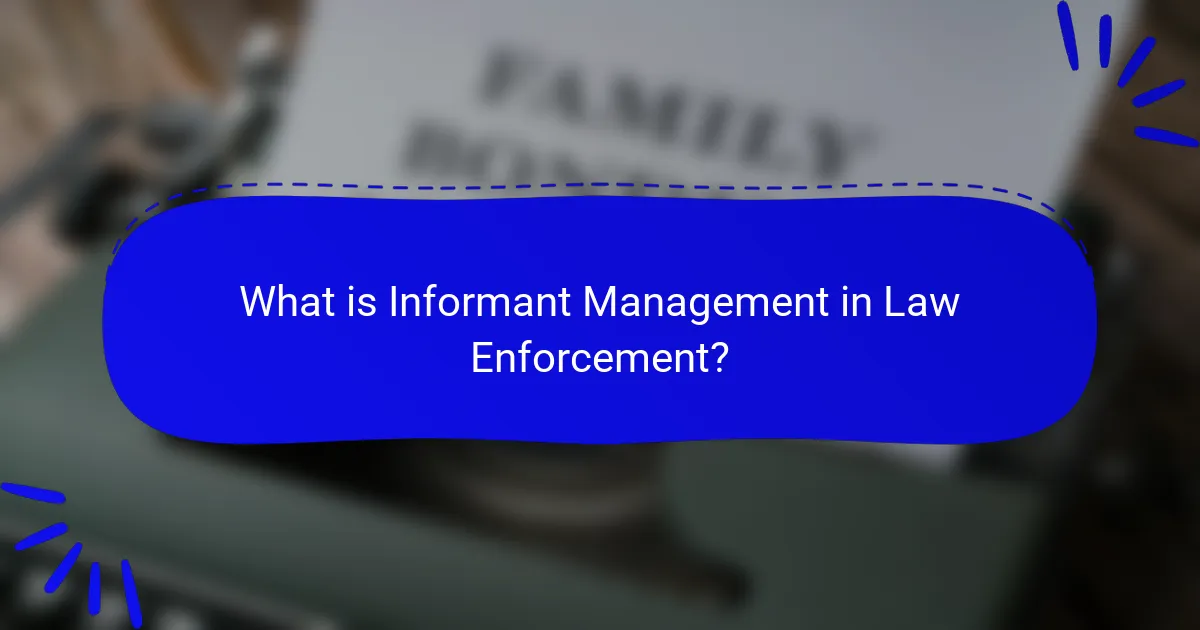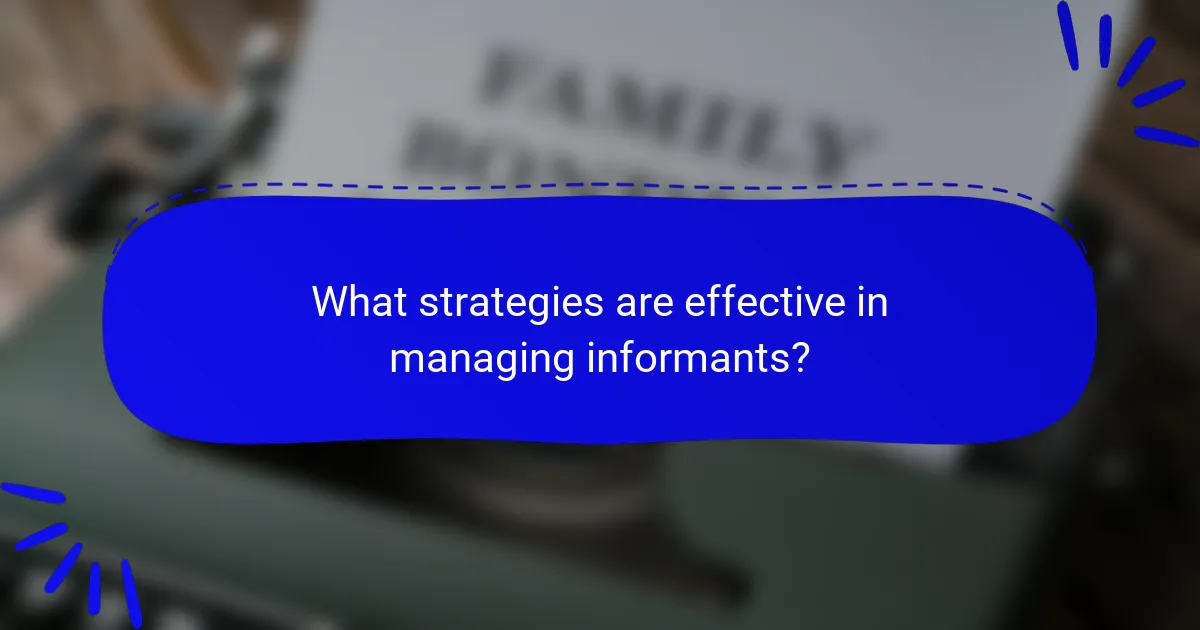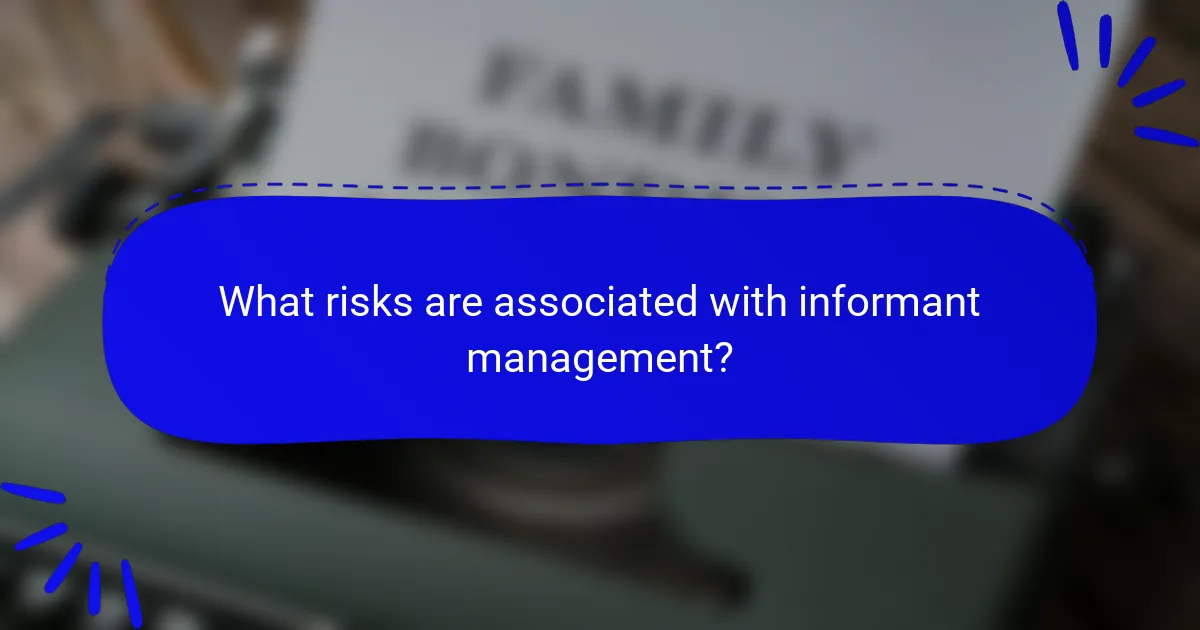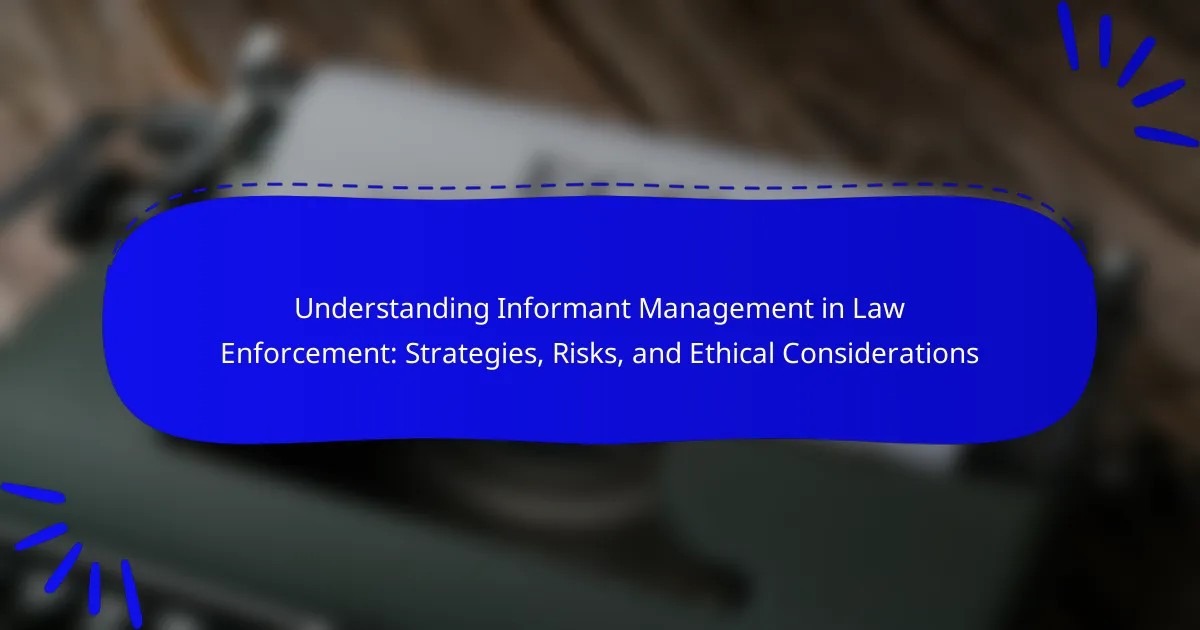
What is Informant Management in Law Enforcement?
Informant management in law enforcement refers to the systematic process of recruiting, handling, and utilizing informants to gather intelligence. This process is vital for criminal investigations and intelligence operations. Law enforcement agencies rely on informants to provide information about criminal activities, suspects, and organizations. Effective informant management ensures that the information collected is reliable and actionable. It involves establishing trust, maintaining confidentiality, and ensuring the safety of informants. Additionally, agencies must navigate legal and ethical considerations while managing informants. Proper training and protocols are essential for law enforcement personnel to effectively manage informants and mitigate associated risks.
How is informant management defined within law enforcement contexts?
Informant management in law enforcement is defined as the systematic process of recruiting, handling, and utilizing informants to gather intelligence and evidence. This process includes establishing trust, ensuring confidentiality, and providing incentives for cooperation. Effective informant management is crucial for successful investigations and operations. It involves assessing the reliability of informants and managing the risks associated with their use. Law enforcement agencies often have specific protocols and guidelines to ensure ethical treatment and legal compliance in informant interactions.
What are the key components of informant management?
The key components of informant management include recruitment, training, communication, and evaluation. Recruitment involves identifying potential informants who can provide valuable information. Training ensures informants understand their roles and responsibilities. Communication establishes clear channels for sharing information and updates. Evaluation assesses informant reliability and effectiveness over time. These components are essential for maintaining effective informant relationships and ensuring operational success in law enforcement.
Why is informant management critical for law enforcement operations?
Informant management is critical for law enforcement operations because it enhances intelligence gathering. Effective management allows agencies to utilize informants for obtaining actionable information on criminal activities. This information can lead to arrests, seizures, and the disruption of criminal enterprises. A study by the Bureau of Justice Assistance highlights that informants can provide insights that are not accessible through traditional investigative methods. Additionally, proper management ensures the safety of informants, which is essential for maintaining trust and cooperation. The National Institute of Justice emphasizes the need for clear protocols in managing informants to mitigate risks and ethical concerns. Overall, effective informant management directly contributes to the success of law enforcement missions.
What roles do informants play in law enforcement?
Informants play critical roles in law enforcement by providing valuable information about criminal activities. They assist in gathering intelligence that can lead to arrests and prosecutions. Informants can also infiltrate criminal organizations, offering insights that law enforcement may not access otherwise. Additionally, they may testify in court, providing evidence against suspects. The use of informants can enhance investigations and improve community safety. Studies show that informants have been pivotal in solving high-profile cases, demonstrating their importance in law enforcement strategies.
How do informants contribute to investigations?
Informants contribute to investigations by providing critical information that can lead to arrests and prosecutions. They may offer insights into criminal activities, including details about suspects, locations, and methods. Informants can help law enforcement agencies gather evidence that is otherwise difficult to obtain. Their information often aids in building cases against larger criminal organizations. In many instances, informants have been instrumental in uncovering drug trafficking networks and organized crime operations. The effectiveness of informants is supported by numerous successful cases where their tips resulted in significant law enforcement actions. Their cooperation can also enhance undercover operations, making them more effective and safer.
What types of informants are commonly used in law enforcement?
Law enforcement commonly uses several types of informants. These include confidential informants, who provide information while remaining anonymous. Another type is cooperating witnesses, who agree to assist law enforcement in exchange for leniency. Law enforcement also utilizes undercover agents, who operate within criminal organizations to gather intelligence. Additionally, there are anonymous tipsters, who provide information without revealing their identity. Each type serves a specific purpose in investigations, enhancing the effectiveness of law enforcement operations.

What strategies are effective in managing informants?
Effective strategies for managing informants include building trust, maintaining clear communication, and providing appropriate incentives. Trust is essential for informants to feel safe and valued. Regular check-ins help to ensure that informants remain engaged and informed. Clear expectations should be established to avoid misunderstandings. Providing incentives, such as monetary rewards or protection, can motivate informants to provide valuable information. Training law enforcement personnel on informant management can enhance overall effectiveness. Research indicates that structured management processes lead to more reliable informant contributions. These strategies collectively improve the quality and reliability of information gathered from informants.
How can law enforcement agencies build strong relationships with informants?
Law enforcement agencies can build strong relationships with informants by establishing trust and open communication. Trust is essential for informants to feel safe and valued. Agencies should ensure confidentiality to protect informants’ identities. Regular check-ins can help maintain rapport and show that the agency cares about the informant’s well-being. Providing support, such as legal assistance or financial compensation, can also strengthen these relationships. Training officers to be empathetic and respectful fosters a positive environment. According to a study by the National Institute of Justice, effective informant management relies on mutual respect and understanding. This approach leads to more reliable information and successful outcomes in investigations.
What communication techniques enhance informant trust?
Active listening enhances informant trust. It shows respect and understanding towards the informant’s perspective. Building rapport through personal connection fosters a sense of safety. Transparency in communication about intentions and processes builds credibility. Consistency in messaging reinforces reliability and trustworthiness. Empathy in responses helps informants feel valued and understood. Providing feedback on the informant’s information demonstrates appreciation and encourages future cooperation. Non-verbal cues, such as eye contact and open body language, also contribute to a trusting environment.
How do agencies assess informant reliability?
Agencies assess informant reliability through various methods. They evaluate the informant’s past performance and accuracy of information. Agencies consider corroboration with other evidence to validate claims. They analyze the informant’s motives and potential biases. Background checks are conducted to understand the informant’s history. Agencies also use structured interviews to gauge credibility. The context of the information provided is critically assessed. Reliability assessments are documented for ongoing review and accountability.
What training and resources are necessary for effective informant management?
Effective informant management requires specialized training and resources. Training should include legal guidelines for informant handling. Officers must understand ethical considerations in informant relationships. Communication skills training is essential for building trust with informants. Resources should include access to legal counsel for guidance. Technology tools for tracking and managing informant information are also necessary. Continuous education on evolving laws and best practices is vital. Research indicates that well-trained officers are more effective in managing informants, leading to successful operations.
What best practices should be implemented in informant training?
Implementing best practices in informant training is crucial for effective informant management. Training should include comprehensive legal education to ensure informants understand their rights and responsibilities. Regular updates on laws and policies are necessary to keep informants informed. Role-playing scenarios can enhance decision-making skills in high-pressure situations. Establishing clear communication channels fosters trust and transparency between law enforcement and informants. Documentation of all interactions is essential for accountability and future reference. Continuous evaluation of informant performance helps identify areas for improvement. Training should also emphasize ethical considerations to maintain integrity in operations.
How can technology assist in informant management?
Technology can assist in informant management by providing secure communication channels. These channels protect sensitive information shared between law enforcement and informants. Additionally, technology enables the use of databases for tracking informant activities. Such databases help manage informant profiles and monitor their reliability.
Mobile applications can facilitate real-time updates and communication. This ensures timely responses to informant reports. Data analytics can also identify patterns in informant information. This assists law enforcement in making informed decisions.
Moreover, technology can enhance training through online resources. This prepares officers to manage informants effectively. Overall, technology streamlines processes and improves the efficiency of informant management in law enforcement.

What risks are associated with informant management?
Risks associated with informant management include compromised integrity and reliability of information. Informants may provide false or misleading information for personal gain. There is also a risk of informants becoming unreliable due to external pressures or influences. Additionally, informants may face retaliation or harm from criminal organizations if their identity is revealed. Legal risks arise from improper handling of informants, potentially leading to violations of rights. Ethical dilemmas can occur when informants engage in illegal activities while cooperating with law enforcement. Overall, these risks necessitate careful management and oversight of informant relationships.
What ethical considerations arise in the use of informants?
Ethical considerations in the use of informants include issues of trust, coercion, and accountability. Informants may provide information under duress, raising questions about the voluntariness of their cooperation. The potential for exploitation exists, particularly if informants are from marginalized communities. Confidentiality must be respected to protect informants from retaliation or harm. Law enforcement agencies must ensure that informants are not incentivized to fabricate information. The ethical obligation to ensure justice can conflict with the need for intelligence. Transparency in informant management practices is crucial for maintaining public trust. Lastly, oversight mechanisms are necessary to prevent abuse and ensure ethical compliance in informant operations.
How do ethical dilemmas impact law enforcement practices?
Ethical dilemmas significantly impact law enforcement practices by influencing decision-making processes. Officers often face conflicting values between enforcing the law and ensuring justice. These dilemmas can lead to misconduct, such as excessive force or corruption. Research shows that ethical training improves officers’ ability to navigate these challenges. For instance, a study by the International Association of Chiefs of Police found that ethical training reduces instances of unethical behavior in law enforcement. Additionally, ethical dilemmas can affect community trust in law enforcement. When officers act unethically, public confidence diminishes, leading to strained relationships. Overall, ethical considerations are crucial in shaping law enforcement practices and maintaining public trust.
What policies can mitigate ethical risks in informant management?
Policies that can mitigate ethical risks in informant management include strict guidelines for recruitment and oversight. Implementing a transparent process for selecting informants ensures accountability. Regular training on ethical standards for law enforcement personnel is essential. Establishing a review board for informant cases promotes oversight and ethical compliance. Clear documentation of informant interactions and agreements protects both parties. Additionally, limiting the use of informants in sensitive cases reduces potential ethical dilemmas. These measures are supported by research indicating that structured informant management decreases misconduct and enhances integrity in law enforcement practices.
What legal challenges might law enforcement face with informants?
Law enforcement may face several legal challenges with informants. These challenges include issues of reliability and credibility. Informants may provide false information, leading to wrongful arrests or prosecutions. Additionally, there are concerns about the legality of the methods used to recruit and manage informants. Courts may scrutinize the circumstances under which information was obtained. Informants may also engage in illegal activities while cooperating, complicating legal proceedings. There are also potential violations of due process rights if informants are not properly vetted. Furthermore, law enforcement agencies must navigate the complexities of confidentiality and privilege regarding informant identities. These legal challenges can significantly impact investigations and prosecutions.
How can law enforcement navigate confidentiality issues?
Law enforcement can navigate confidentiality issues by implementing strict protocols for information handling. They should establish clear guidelines that define what constitutes confidential information. Training officers on these protocols is essential to ensure compliance. Regular audits of information access can help identify potential breaches. Collaborating with legal experts ensures adherence to privacy laws. Utilizing secure communication channels protects sensitive information during transmission. Documenting all interactions with informants maintains transparency and accountability. These measures collectively enhance the integrity of confidentiality in law enforcement operations.
What are the implications of informant misconduct?
Informant misconduct can severely undermine law enforcement operations. It may lead to false information being provided, resulting in wrongful arrests or convictions. This misconduct can damage the credibility of law enforcement agencies. A loss of public trust often follows, complicating future investigations. Legal consequences may arise, including lawsuits against agencies. Additionally, informant misconduct can compromise ongoing investigations, leading to operational failures. The overall effectiveness of crime prevention strategies may be diminished as a result.
What are the best practices for ethical informant management?
Best practices for ethical informant management include establishing clear guidelines for informant recruitment and use. Law enforcement agencies should ensure transparency in their relationships with informants. This involves documenting interactions and maintaining open communication. Agencies must prioritize the safety and well-being of informants. Providing support and resources can help mitigate risks they face. Training officers on ethical standards is crucial for consistent application. Regular audits of informant management practices can enhance accountability. These practices are supported by the National Institute of Justice, which emphasizes the importance of ethical standards in informant management.
How can law enforcement agencies ensure accountability in informant management?
Law enforcement agencies can ensure accountability in informant management by implementing strict oversight protocols. These protocols should include thorough documentation of informant interactions and activities. Regular audits of informant files can help maintain transparency. Training officers on ethical informant handling is crucial for compliance. Establishing clear guidelines for informant compensation can prevent misconduct. Agencies should also foster open communication channels for reporting concerns. Utilizing technology to track informant contributions can enhance accountability. Research indicates that agencies with robust oversight mechanisms experience fewer ethical violations.
What role does oversight play in ethical informant practices?
Oversight ensures that ethical informant practices are maintained within law enforcement. It involves monitoring informant interactions to prevent misuse and abuse of power. Oversight mechanisms include regular audits, reviews, and adherence to established protocols. These measures help safeguard against coercion or exploitation of informants. Additionally, oversight promotes accountability among law enforcement personnel. Research indicates that effective oversight reduces the risk of unethical behavior and enhances public trust. Studies show that jurisdictions with strong oversight frameworks report fewer ethical violations involving informants. Thus, oversight is crucial for maintaining integrity in informant management.
The primary entity of this article is “Informant Management in Law Enforcement,” which encompasses the systematic process of recruiting, handling, and utilizing informants to gather intelligence for criminal investigations. The article outlines key components of informant management, including recruitment, training, communication, and evaluation, emphasizing their critical roles in enhancing intelligence gathering and operational success. It also addresses the risks and ethical considerations associated with informant use, highlighting the importance of trust, confidentiality, and legal compliance. Furthermore, effective strategies for managing informants and ensuring accountability within law enforcement agencies are discussed, providing a comprehensive overview of best practices in ethical informant management.
